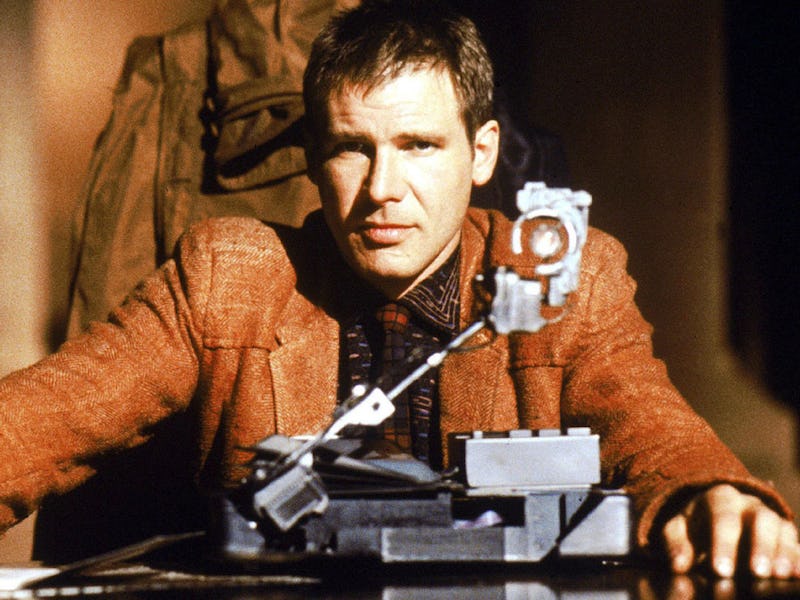Harrison Ford’s Oscars Blade Runner joke reveals a dark truth about the movie
Blade Runner's biggest production hurdle wasn't just in the editing room.

Sometimes, it’s hard separating movie-making myths from movie-making facts — especially when it comes to Blade Runner.
Case in point: during the 93rd Academy Awards on April 25, 2021, while presenting the Oscar for best editing, Harrison Ford made a joke about the post-production of the original 1982 Blade Runner. The thing is, it basically wasn’t a joke.
Here’s where those Blade Runner editing notes actually came from, and what they really mean.
While presenting the 2021 Oscar for Best Film Editing, Harrison Ford read from a list of notes, out of context, that may have sounded wild if you’ve never seen Blade Runner. Among Ford’s edit notes:
- “Opening too choppy.”
- “Why is this voice-over track so terrible? He sounds drunk? Were they all on drugs?”
- “Deckard at the piano is interminable. Flashback/dialogue is confusing. Is he listening to a tape?”
- “Why do we need the third cut to the eggs?”
- “The synagogue music on the street is awful. We’ve got to use Vangelis.”
- “Up to Zora’s death, the movie is deadly dull.”
- “This movie gets worse every screening.”
If the words “Deckard” or “Zora” or “Vangelis” didn’t give it away (which apparently it didn’t for some audience members) Ford confirmed, “that movie was called Blade Runner.” And then he quipped, “And these notes can help us understand why the editing process can sometimes get a little complicated.”
It’s a good joke, but the only thing is, the editing notes don’t come from anyone who actually edited the movie Blade Runner. These notes come from a 1982 memo from producer Bud Yorkin and then-CEO of Tandem Productions Jerry Perenchio. Several fans on Twitter reproduced the memo, which is also referenced in the book Future Noir: The Making of Blade Runner by Paul M. Sammon.
A snippet of the actual 1982 memo that Ford was referencing in his Oscar’s speech. Note the corrected date on the top, also note that Ford paraphrased a few of the comments.
There’s a lot that can be said about the production and post-production of 1982’s Blade Runner. Sammon’s book is the essential place to start, but the 3.5-hour documentary Dangerous Days is pretty great too. (In 2007, Dangerous Days was included as a special feature on the deluxe version of Ridley Scott’s Final Cut of the movie, but as of now, that doc is not available streaming even though The Final Cut is on HBO Max.)
Without copying and pasting the entire text of Paul M. Sammon’s book, or downloading Dangerous Days directly to your brain, here are two things Ford’s joke kind of misrepresents.
First, Ridley Scott and Terry Rawlings edited Blade Runner, not Bud Yorkin and Jerry Perenchio, who, in the context of this memo were the money guys, not the film editing guys.
Second, the infamous Blade Runner voiceover fiasco is less cut-and-dried than it might seem. The legend is that the money people (like Yorkin and Perenchio) asked for a voice-over to make the movie more comprehensible, but that Ford botched the recording on purpose because he hated the voice-over. However, there were three different voiceovers recorded for the movie, and early in the production, the idea of a film-noir-style voiceover was Ridley Scott’s idea. In Sammon’s book, he notes that editor Terry Rawlings felt that a “weary voiceover for a cynical film noir is indeed a time-honored cinematic device.”
These days, we tend to reject the voiceover of Blade Runner as misguided because the final version in the theatrical release was mandated by people who weren’t director Ridley Scott. Ford’s 2021 pithy re-reading of the notes from Yorkin and Perenchio muddies the waters a bit because it’s almost like he makes it sounds like they were against the voiceover, too, when, in fact, they were for it. They just didn’t like the way it turned out.
Because Ridley Scott’s preferred version of Blade Runner contains no voiceover, this puts the final nail through Batty’s replicant hand. We’re all supposed to think the Deckard voiceover was silly because The Final Cut was so much better without it. This is subjectively true, but when Ford says this is an example of “why the editing process can sometimes get a little complicated,” he’s kind of underselling just how complicated the production process of Blade Runner was, all of which occurred way before the editing stage.
As far as Deckard at the piano? Well that “interminable” scene, of course, would lead to the unicorn dream sequence that lets us know Deckard might really be a Replicant himself. Does Harrison Ford still dream of tinfoil unicorns? Is there a perfect version of Blade Runner somewhere suppressed in our memories? We’ll probably never know, but if there was ever an Oscar for most tumultuous science fiction movie production, Blade Runner would win easily.